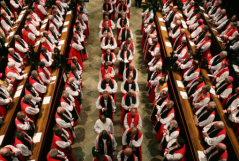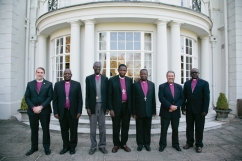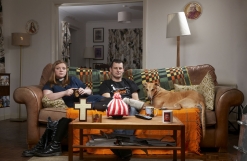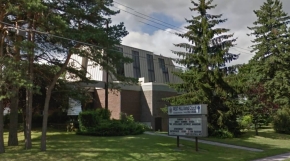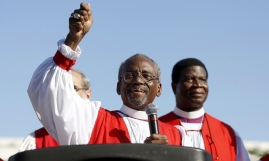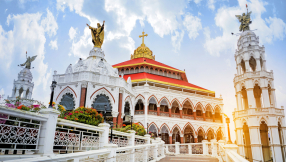The Archbishop of Canterbury has intervened with a rare and strong public criticism of The Episcopal Church of the US after its bishops voted to change the definition of marriage so clergy can conduct same-sex marriages.
The Most Rev Justin Welby expressed "deep concern" about the "stress" for the Anglican Communion after TEC's House of Bishops passed a resolution to remove any reference to marriage as between a man and a woman from the canons.
He conceded that TEC is entitled to address issues appropriate to its own context, but Archbishop Welby said that this latest decision "will cause distress for some and have ramifications for the Anglican Communion as a whole, as well as for its ecumenical and interfaith relationships."
His statement marks his concern that the Church will once more seen to be looking inwards to its own struggles while the wider world is in turmoil from terrorism, climate extremes, economic crises and other trauma.
Lambeth Palace said in its statement: "At a time of such suffering around the world, he stated that this was a moment for the church to be looking outwards. We continue to mourn with all those who are grieving loved ones and caring for the injured from the terrorist attacks in Sousse, Kuwait and Lyons, and from the racist attacks in Charleston."
The Archbishop also urged prayer for the life of the Anglican Communion and for a space for the strengthening of the interdependent relationships between provinces, so that in the face of diversity and disagreement, Anglicans may be a force for peace.
He was speaking after the bishops voted to change marriage law to allow clergy to conduct ceremonies for same-sex couples in a debate that was conducted in a manner which showed a renewed spirit of conciliation and compromise over this difficult issue.
The move contrasts with the Church of England which secured an exemption in law from ever having to perform a gay marriage ceremony when Parliament passed the legislation.
The US bishops, meeting yesterday at the church's General Convention in Salt Lake City in Utah, voted to change the language used in the marriage service to gender-neutral forms.
In new trial rites to be made available for heterosexual and same-sex couples, Holy Matrimony, previously defined in Canon I.18 as a physical and spiritual union of a man and a woman, will be described instead as between couples.
The Book of Common Prayer will retain the words "man and woman" for those who wish to continue to use the traditional service form.
The original report recommending the change said it would address "the pastoral need for priests to officiate at a civil marriage of a same-sex couple".
The requirement that a couple sign a declaration stating they "solemnly declare that we hold marriage to be a lifelong union of husband and wife as it is set forth in the Book of Common Prayer" was also to be removed, the original report said.
Clergy will however be able to opt out of performing the ceremonies.
The report, and then this week's vote by the bishops, followed a vote at the last General Convention in 2012 for a group of theologians, liturgists, pastors and educators to work together to "identify and explore biblical, theological, historical, liturgical and canonical dimensions of marriage."
George Conger, writing in Anglican Ink, said a clear pattern of compromise and accommodation had emerged in the debates in the House of Bishops.
"It is within the legislative power of those supporting same-sex marriage to pass an immediate and mandatory rule requiring same-sex marriage. While the conservatives are not able to block gay marriage, the threat of their of defection to another Anglican entity exists," he said, but he noted that both sides were doing their best to accommodate their their opponents.
He reported Bishop of Northern Indiana, Edward Little II, telling the House of Bishops that as a "matter of conscience and Christian conviction" he could not vote in favor of the resolution. The Episcopal Church "did not have the authority to change the sacrament of marriage."
Bishop Little thanked his fellow bishops for the "wonderful generosity of spirit" in "allowing clergy and dioceses" to say no to same-sex marriage and retain their place within the church. He hoped that that in "three, six, nine or eighteen years time" the House would not forget this "generosity" and continue to allow "those who hold a traditional view to have a place in this church."
Bishop of Georgia, Scott Benhase asked for clarification of an amendment permitting dissent, asking if a priest who wanted to conduct a same-sex marriage do so even if his bishop had forbidden it.
The Presiding Bishop, the Most Rev Katharine Jefferts Schori, said a priest did not have the authority to celebrate the rite without the permission of their bishop.
Bishop of New Hampshire Gene Robinson said: "Could we also remember that we are to be sensitive to the pastoral needs of same-sex couples, not just bishops." The church had tolerated bishops who had refused to ordain women for too long, he argued, noting that the pains of those denied ordination had been outweighed by the desire to accommodate traditionalists.
Conger commented in his report: "Fears that what was given today could be taken away in the future, appear unlikely due to the composition of the House of Bishops. The animosity, grandstanding, and disorder that accompanied the debates of the last two decades has all but disappeared. Whereas pride was once considered the defining mark of the House of Bishops, the current mood is one of reconciliation, accommodation and dialogue."










